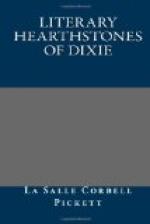Upon his return from college, Timrod, with some dim fancies concerning a forensic career circling around the remote edges of his imagination, entered the office of his friend, Judge Petigru. The “irrepressible conflict” between Law and Poesy that has been waged through the generations broke forth anew, and Timrod made the opposite choice from that reached by Blackstone. Judging from the character of the rhythmic composition in which the great expounder of English law took leave of the Lyric Muse, his decision was a judicious one. Doubtless that of our poet was equally discreet. When the Club used to gather in Russell’s book-shop on King Street, Judge Petigru and his recalcitrant protege had many pleasant meetings, unmarred by differences as to the relative importance of the Rule in Shelley’s Case and the flight of Shelley’s Lark.
Henry Timrod was thrust into the literary life of Charleston at a time when that life was most full of impelling force. It was a Charleston filled with memories quite remote from the poetry and imaginative literature which represented life to the youthful writers. It was a Charleston with an imposing background of history and oratory, forensic and legislative, against which the poetry and imagination of the new-comers glittered capriciously, like the glimmering of fireflies against the background of night, with swift, uncertain vividness that suggested the early extinguishing of those quivering lamps. But the heart of Charleston was kindled with a new ambition, and the new men brought promise of its fulfilment.
Others have given us a view of the literary life of Charleston, of her social position, of her place in the long procession of history. To Timrod it was left to give us martial Charleston, “girt without and garrisoned at home,” looking “from roof and spire and dome across her tranquil bay.” With him, we see her while
Calm as that second summer
which precedes
The first fall
of the snow,
In the broad sunlight of heroic
deeds
The City bides
the foe.
Through his eyes we look seaward to where
Dark Sumter, like a battlemented
cloud,
Looms o’er
the solemn deep.
We behold the Queen City of the Sea standing majestically on the sands, the storm-clouds lowering darkly over her, the distant thunders of war threatening her, and the pale lightnings of the coming tempest flashing nearer,
And down the dunes a thousand
guns lie couched,
Unseen, beside
the flood—
Like tigers in some Orient
jungle crouched
That wait and
watch for blood.




